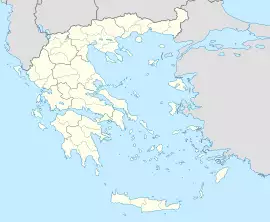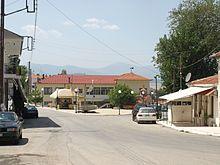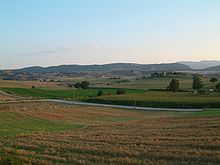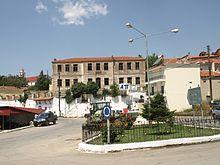Vevi Βεύη | |
|---|---|
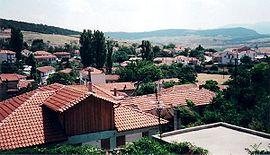 Vevi | |
| Coordinates: 40°46′N 21°37′E / 40.767°N 21.617°E | |
| Country | Greece |
| Administrative region | West Macedonia |
| Regional unit | Florina |
| Municipality | Florina |
| Municipal unit | Meliti |
| Population (2011)[1] | |
| • Rural | 663 |
| Time zone | UTC+2 (EET) |
| • Summer (DST) | UTC+3 (EEST) |
| Postal code | 539 74 |
| Area code(s) | 2385 |
Vevi (Greek: Βεύη, before 1926: Μπάνιτσα - Banitsa,[2] Macedonian and Bulgarian: Баница, Banica or Banitsa) is a village located in the municipal unit of Meliti in Florina regional unit, Macedonia, Greece. The village is passed by two national roads which lead to Thessaloniki, Florina, Amyntaio, and Kozani. Additionally, it has a railway station on the line between Florina and Thessaloniki.
Economy
It is mainly a farming community and is the site of the Achlada, the Vevi lignite mines from Upper Miocene.
History
The city dates back to Roman times. Archeological finds from this period, such as the marble torso of a male statue, are housed at the Archaeological Museum of Florina.[3]
The local church St. Nicolas was built and painted in 1460.[4] There were 132 Christian households in the village in the first half of the 17th century.[5] In 1845 the Russian slavist Victor Grigorovich recorded Banci as mainly Bulgarian village.[6]
According to local tradition, the settlers who laid the foundation of the modern village included various people from the region such as Greeks, Bulgarians, Turks, etc. There were two Bulgarian schools in the beginning of 20th century.[7]
In 1913, with the conditions of the Treaty of Bucharest, when this part of Macedonia became part of Greece, and after the Balkan Wars, a lot of locals emigrated to Bulgaria. The village was renamed Vevi in 1926.[2] Following World War II as well as the Greek Civil War it saw more exodus on the part of the town's non-Greek inhabitants.
A 1993 survey of the area found that much of the population over the age of 30 were Macedonian speakers.[8]
Notable people
- Antigonos Choleris (-1913), Greek chieftain of the Macedonian Struggle and soldier of the Balkan Wars.
- Stavros Kotsopoulos, Greek chieftain of the Macedonian Struggle and soldier of World War II.
- Peter Daicos, Australian AFL footballer whose father migrated to Melbourne, Australia.
See also
References
- ^ a b "Απογραφή Πληθυσμού - Κατοικιών 2011. ΜΟΝΙΜΟΣ Πληθυσμός" (in Greek). Hellenic Statistical Authority.
- ^ a b Name changes of settlements in Greece
- ^ http://www.macedonian-heritage.gr/Museums/Archaeological_and_Byzantine/Arx_Florinas.html
- ^ Кил, Махиел. Изкуство и общество в България през турския период, София 2002, с. 252.
- ^ Турски извори за българската история, т. VII, София 1986, с. 333
- ^ Григорович, В. Очеркъ путешествiя по Европейской Турцiи, Москва, 1877
- ^ D.M.Brancoff. "La Macedoine et sa Population Chretienne". Paris, 1905, p.176-177.
- ^ Riki Van Boeschoten. "Usage des langues minoritaires dans les départements de Florina et d’Aridea (Macédoine)"
